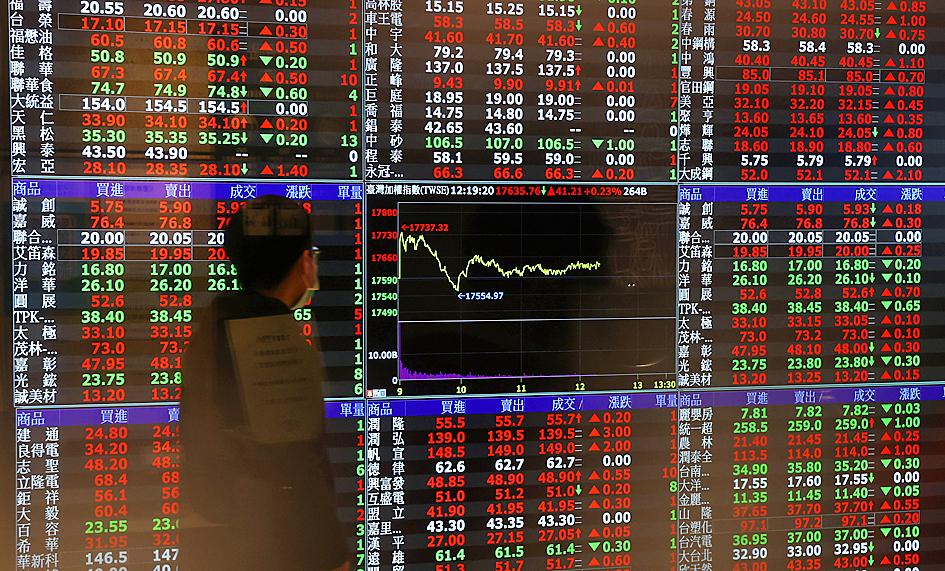Russia’s invasion of Ukraine has disrupted the bullish momentum in financial stocks, while the pace of US Federal Reserve interest rate increases and global supply chains adapting to the post-COVID-19 period is expected to continue to affect Taiwanese equities, Allianz Global Investors Taiwan Ltd (安聯投信) said on Friday.
“Concerns over default on Russian sovereign debt and expectations of a slower pace of Fed interest rate adjustments [in light of the Ukraine-Russia war] are unfavorable for the performance of financial stocks,” the company’s Taiwan equity research team said in a note.
Taiwan Stock Exchange (TWSE) data showed that the main bourse’s financial and insurance subindex retreated 3.03 percent last week, reflecting the poor performance of financial sector shares.

Photo: CNA
The exposure of Taiwanese banks, insurers, securities firms and individual investors to the Ukrainian and Russian markets totaled NT$217.9 billion (US$7.78 billion) as of the end of last month, the Financial Supervisory Commission said on Friday.
The nation’s exposure to the two markets was relatively small compared with other countries, the agency said.
As for electronics stocks, Allianz strategists said that the market remains worried about potential adverse effects of supply-demand changes on price and inventory adjustments.
The short-term performance of stocks in the sector largely depends on the respective company’s financial results for the fourth quarter of last year, they said.
So far, traditional industry stocks seem to be safer bets, with investors moving more assets to the sector, Allianz said, adding that stocks of firms in the transportation and steel sectors are performing better than other traditional industry stocks.
The strategists said that in volatile times, investors increasingly favor stocks with medium to long-term growth potential, such as in the high-performance computing, artificial intelligence, servers and electric vehicle sectors.
Shares of semiconductor companies with higher order visibility might also benefit, as investors’ worries over slim inventory have made the stocks quite cheap, Allianz said.
The strategists’ advice came after the TAIEX on Friday closed 0.33 percent higher at 17,652.18 points on a technical rebound, following a 2.55 percent fall in the previous session.
The TAIEX dropped 3.18 percent for the whole of last week, while it has so far this year retreated 3.11 percent, TWSE data showed.
Foreign institutional investors continued to stand on the sell side to unload local equities on Friday, selling a net NT$51.03 billion of shares on the main board, TWSE data showed.
In the week, foreign institutional investors sold a net NT$166.54 billion of local shares after selling a net NT$6.31 billion a week earlier, the exchange's data showed.
The most actively traded stocks last week were semiconductor shares with a total turnover of NT$492 billion, followed by shipping stocks at NT$455.5 billion and electronic component stocks at NT$145 billion, the data showed.
Additional reporting by Kao Shih-ching

MULTIFACETED: A task force has analyzed possible scenarios and created responses to assist domestic industries in dealing with US tariffs, the economics minister said The Executive Yuan is tomorrow to announce countermeasures to US President Donald Trump’s planned reciprocal tariffs, although the details of the plan would not be made public until Monday next week, Minister of Economic Affairs J.W. Kuo (郭智輝) said yesterday. The Cabinet established an economic and trade task force in November last year to deal with US trade and tariff related issues, Kuo told reporters outside the legislature in Taipei. The task force has been analyzing and evaluating all kinds of scenarios to identify suitable responses and determine how best to assist domestic industries in managing the effects of Trump’s tariffs, he

TIGHT-LIPPED: UMC said it had no merger plans at the moment, after Nikkei Asia reported that the firm and GlobalFoundries were considering restarting merger talks United Microelectronics Corp (UMC, 聯電), the world’s No. 4 contract chipmaker, yesterday launched a new US$5 billion 12-inch chip factory in Singapore as part of its latest effort to diversify its manufacturing footprint amid growing geopolitical risks. The new factory, adjacent to UMC’s existing Singapore fab in the Pasir Res Wafer Fab Park, is scheduled to enter volume production next year, utilizing mature 22-nanometer and 28-nanometer process technologies, UMC said in a statement. The company plans to invest US$5 billion during the first phase of the new fab, which would have an installed capacity of 30,000 12-inch wafers per month, it said. The

Taiwan’s official purchasing managers’ index (PMI) last month rose 0.2 percentage points to 54.2, in a second consecutive month of expansion, thanks to front-loading demand intended to avoid potential US tariff hikes, the Chung-Hua Institution for Economic Research (CIER, 中華經濟研究院) said yesterday. While short-term demand appeared robust, uncertainties rose due to US President Donald Trump’s unpredictable trade policy, CIER president Lien Hsien-ming (連賢明) told a news conference in Taipei. Taiwan’s economy this year would be characterized by high-level fluctuations and the volatility would be wilder than most expect, Lien said Demand for electronics, particularly semiconductors, continues to benefit from US technology giants’ effort

‘SWASTICAR’: Tesla CEO Elon Musk’s close association with Donald Trump has prompted opponents to brand him a ‘Nazi’ and resulted in a dramatic drop in sales Demonstrators descended on Tesla Inc dealerships across the US, and in Europe and Canada on Saturday to protest company chief Elon Musk, who has amassed extraordinary power as a top adviser to US President Donald Trump. Waving signs with messages such as “Musk is stealing our money” and “Reclaim our country,” the protests largely took place peacefully following fiery episodes of vandalism on Tesla vehicles, dealerships and other facilities in recent weeks that US officials have denounced as terrorism. Hundreds rallied on Saturday outside the Tesla dealership in Manhattan. Some blasted Musk, the world’s richest man, while others demanded the shuttering of his